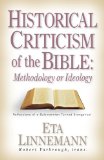Historical Criticism of the Bible: Methodology or Ideology? By Eta Linnemann. Originally published in German as Wissenschaft oder Anfragen and Alternativen. Neuhausen: Friedrich Hanssler, 1986. Translated by Robert Yarborough. Grand Rapids: Baker Book House, 1990. 169 pp. Paper, $9.95.
Eta Linnemann is an eminent continental scholar, a former student of Rudolf Bultmann, and a member of the prestigious Society for New Testament Studies. In 1978 she literally threw her many publications into the trash and invited others to do likewise. She had, in her own words, said Nein! to Historical Criticism because she had said Ja! to the Lord Jesus Christ.
Historical Criticism of the Bible is Professor Linnemann’s first book since her conversion, and she is not mincing words. Addressing the state of affairs in the German universities in the first part of her book, Linnemann calls for a break-away Bible College movement. She then turns to her main topic, Historical Criticism and the Bible. Simply put, Historical Criticism, which operates ut si Deus non daretur (“as if there were no God”), is inherently hostile to evangelical faith. It is not merely that the Bible isn’t read from the perspective of faith, it isn’t even read from the perspective of the possibilityof faith.
Readers of JOTGES will obviously share Linnemann’s concern that faith not be excluded a priorifrom the academy. And they should applaud her frankness and courage. Yet from the perspective of NT scholarship, Historical Criticism of the Bible is little more than a personal confession of faith. I seriously doubt that it will get much (if any) of a hearing from her former colleagues who have probably not heard a pulpit pounded since before their qualifying exams. For my money, a second volume in which she constructively engages those elements of Historical Criticism that are hostile to faith would be welcome.
On a more positive note, time and again Linnemann makes reference to the subtle pressures placed on students in liberal (and sometimes “conservative”) institutions to toe the line. Barraged by an endless litany of “obviously,” “of course,” “everyone now knows,” along with peer pressure from fellow students-who are often more unsparing than professors-and what Linnemann kindly calls “the process of socialization” (e.g., finding someone who will eat lunch with you), most eventually cave in. Linnemann lists herself among the weak. Her humility is disarming, and her point well taken. Most liberals are as coercive as … well … as most of the rest of us. In the end it is not our brains that typically fail us, but our character (cf. James 4:4).
Reading Historical Criticism of the Bible reminded me that the Christian faith is just that. It is a set of beliefs resting ultimately on a personal trust in Jesus Christ. Those who study at institutions that are not sympathetic to such faith should expect to be faced with questions they cannot answer. They should expect their colleagues to find them a little odd. This is the scandal of the Cross, the foolishness of Christianity.
It is a privilege Eta Linnemann now personally knows, and which she seems to have taken in stride.
Paul Holloway
Graduate Student
Department of Early Christian Literature
The University of Chicago
Chicago, IL

